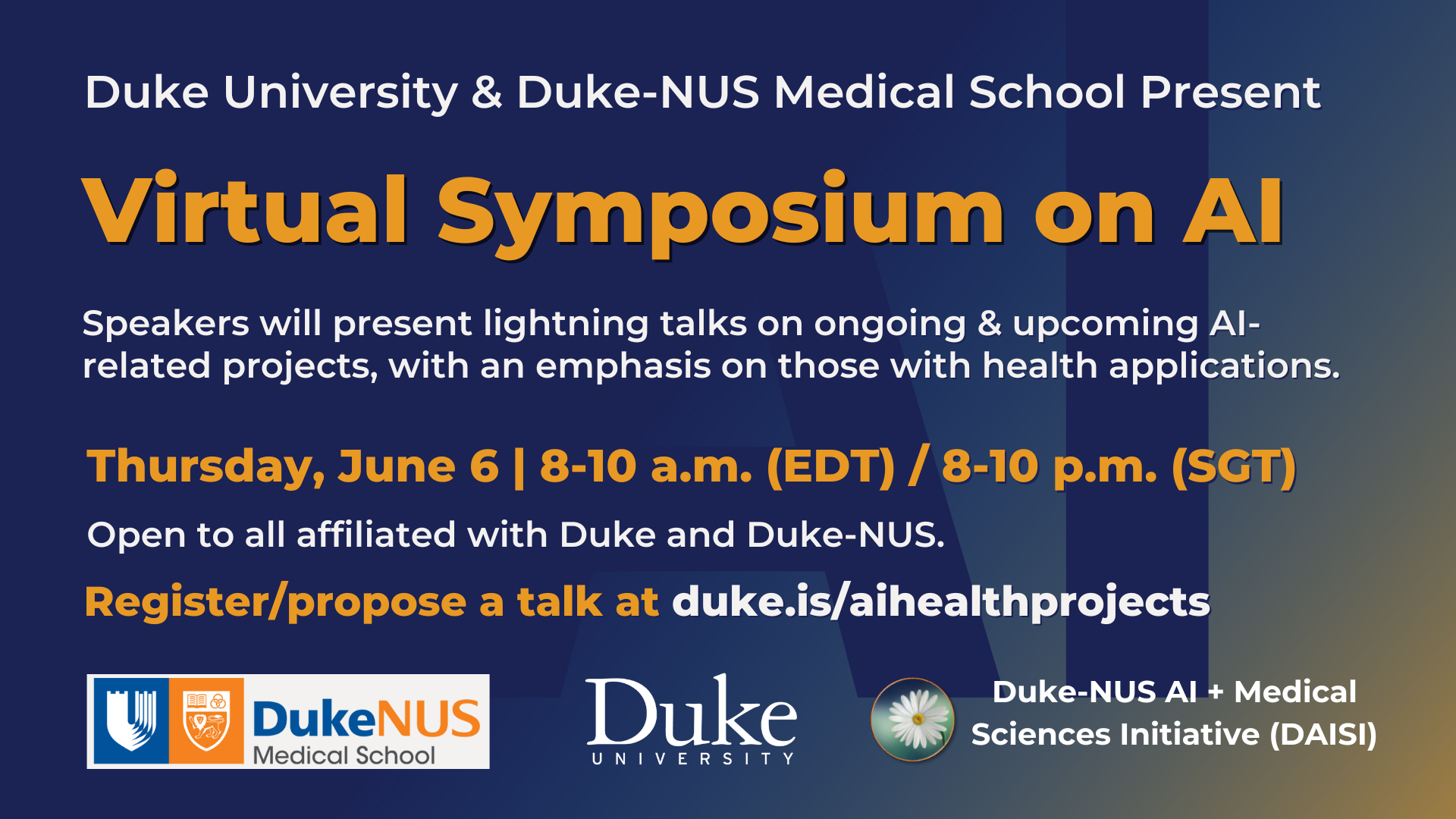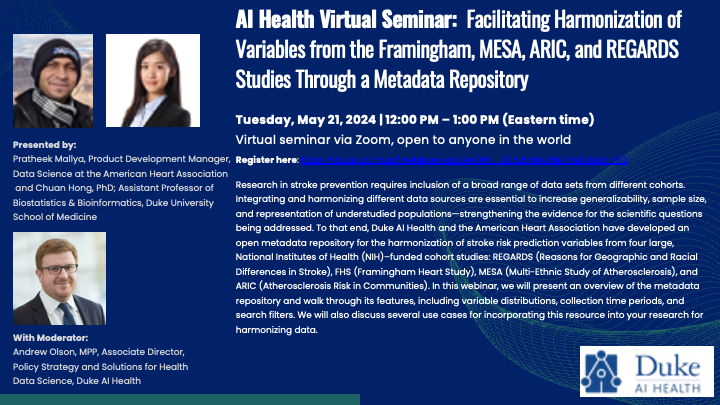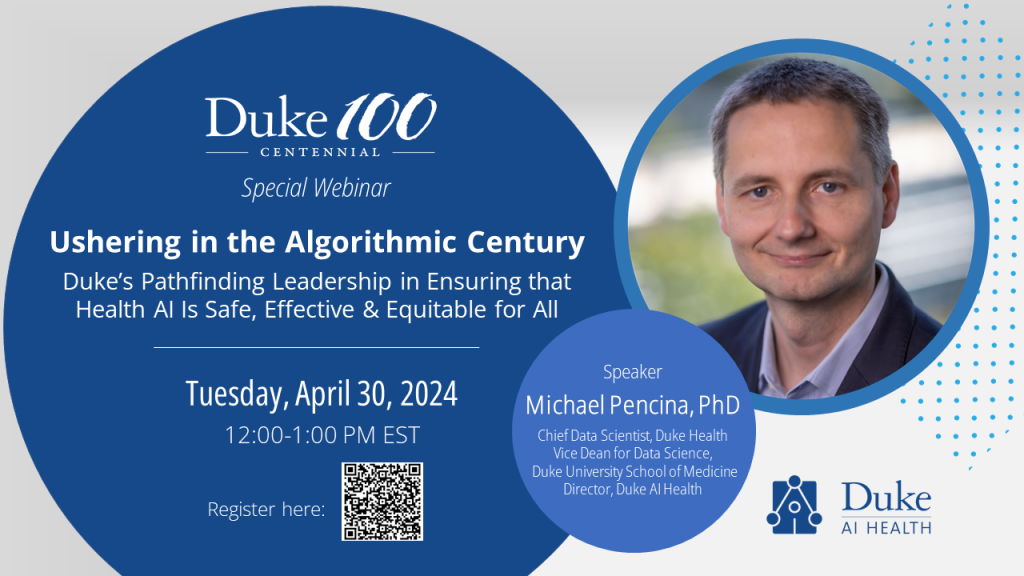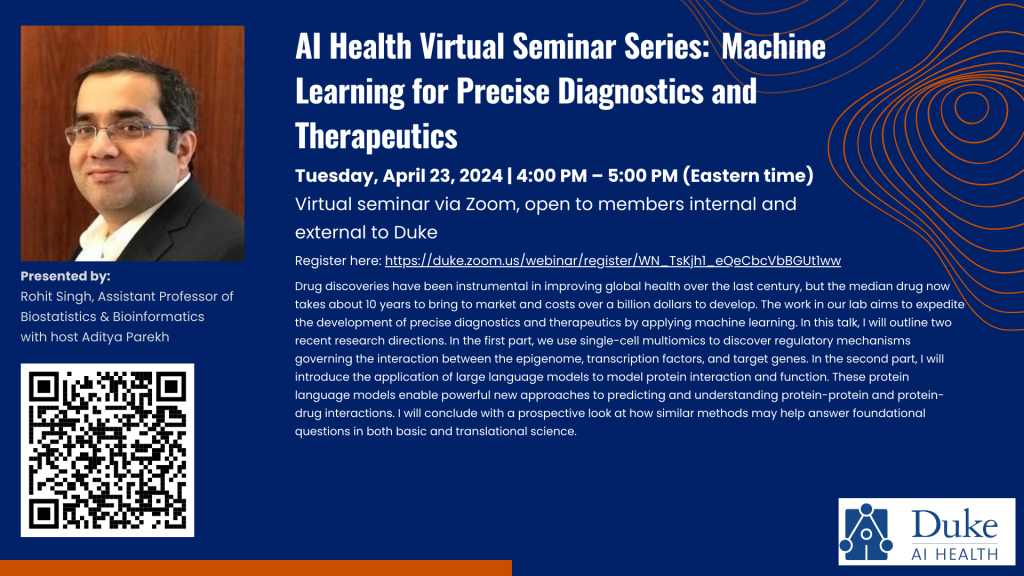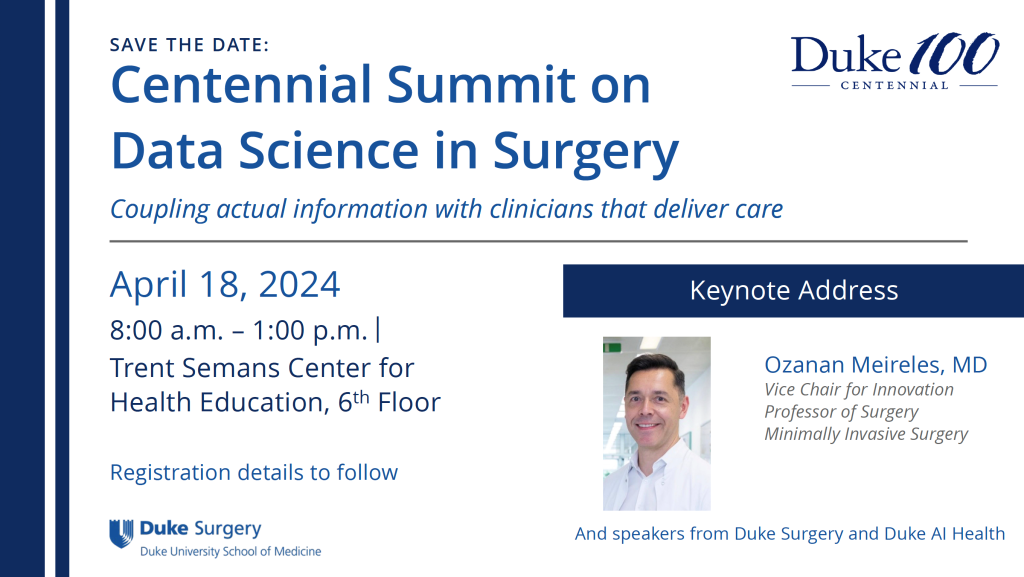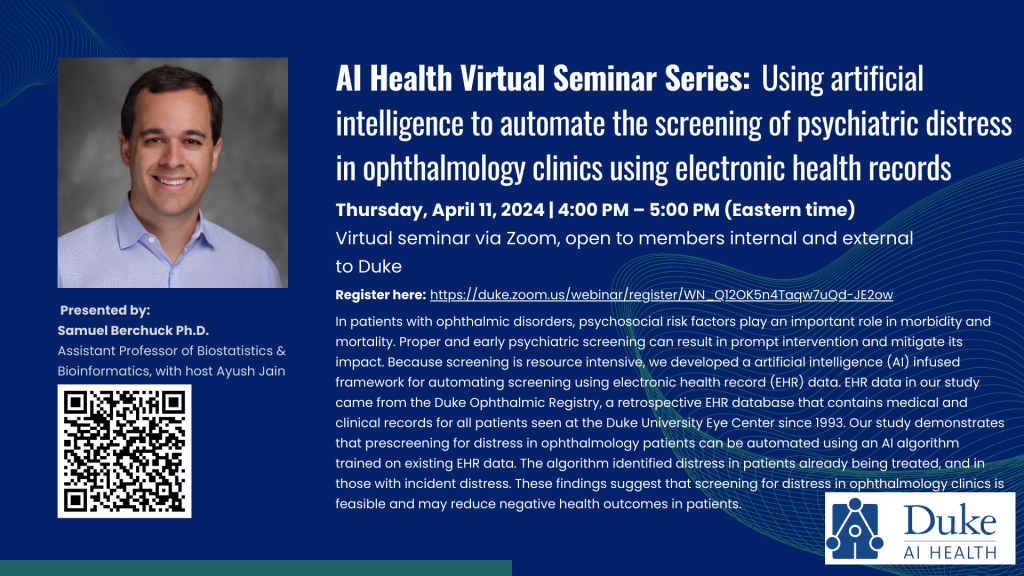FAIR Health Learn
Upcoming Events and Opportunities
Virtual Symposium on AI Presented by DAISI (Duke NUS AI + Medical Sciences Initiative)
Thursday, June 6, 2024 | Virtual seminar, 8:00 AM – 10:00 AM (Eastern time)
Open to all affiliated with Duke and Duke-NUS
Duke University and Duke-NUS Medical School in Singapore’s AI + Medical Sciences Initiative (DAISI) invite you to a virtual symposium on AI, in partnership with the Duke AI Health Community of Practice.
This two-hour event on Thursday, June 6 from 8am – 10am (EDT) will feature lightning talks — short, fast-paced presentations — presented by faculty and staff involved in health-related topics.
Register HereFacilitating Harmonization of Variables from the Framingham, MESA, ARIC, and REGARDS Studies Through a Metadata Repository
Tuesday, May 21, 2024 | Virtual seminar, 12:00 PM – 1:00 PM (Eastern time)
Research in stroke prevention requires inclusion of a broad range of data sets from different cohorts. Integrating and harmonizing different data sources are essential to increase generalizability, sample size, and representation of understudied populations—strengthening the evidence for the scientific questions being addressed. To that end, Duke AI Health and the American Heart Association have developed an open metadata repository for the harmonization of stroke risk prediction variables from four large, National Institutes of Health (NIH)–funded cohort studies: REGARDS (Reasons for Geographic and Racial Differences in Stroke), FHS (Framingham Heart Study), MESA (Multi-Ethnic Study of Atherosclerosis), and ARIC (Atherosclerosis Risk in Communities). In this webinar, we will present an overview of the metadata repository and walk through its features, including variable distributions, collection time periods, and search filters. We will also discuss several use cases for incorporating this resource into your research for harmonizing data.
Register HereUshering in the Algorithmic Century: Duke’s Pathfinding Leadership in Ensuring that Health AI Is Safe, Effective & Equitable for All
Tuesday, April 30, 2024 | Virtual seminar, 12:00 PM – 1:00 PM (Eastern time)
In this seminar, Dr. Michael Pencina, Vice Dean for Data Science, Chief Data Scientist for Duke Health, and Director of Duke AI Health, will examine the ongoing revolution in health data science and the application of artificial intelligence tools to the field of medicine. He will trace the evolution of increasingly sophisticated AI-powered technologies now being leveraged for patient care and clinical research, surveying the challenges and opportunities presented by these algorithmic technologies. In particular, the seminar will focus on the increasingly urgent need for robust oversight of health AI tools that encompass the entire lifecycle of such technologies, from development through validation and deployment. He will explain how robust frameworks of review and continuous oversight – including ones being articulated by Duke and its partners - are critical to ensuring that current and future applications of AI in healthcare and clinical research are safe, accurate, trustworthy, and equitable.
Register HereMachine Learning for Precise Diagnostics and Therapeutics
Tuesday, April 23, 2024 | Virtual Seminar, 4:00 pm - 5:00 pm (Eastern Time)
- Rohit Singh, PhD, Assistant Professor of Biostatistics & Bioinformatics
- with host Aditya Parekh, MS, Duke AI Health Data Science Fellowship Program
Drug discoveries have been instrumental in improving global health over the last century, but the median drug now takes about 10 years to bring to market and costs over a billion dollars to develop. The work in our lab aims to expedite the development of precise diagnostics and therapeutics by applying machine learning. In this talk, I will outline two recent research directions. In the first part, we use single-cell multiomics to discover regulatory mechanisms governing the interaction between the epigenome, transcription factors, and target genes. In the second part, I will introduce the application of large language models to model protein interaction and function. These protein language models enable powerful new approaches to predicting and understanding protein-protein and protein-drug interactions. I will conclude with a prospective look at how similar methods may help answer foundational questions in both basic and translational science.
Register HereCentennial Summit on Data Science in Surgery
Thursday, April 18, 2024 | In person at Trent Semans Center for Health Education, 6th Floor
The Department of Surgery will celebrate Duke's Centennial with the Centennial Summit on Data Science in Surgery, focused on “coupling actual information with clinicians that deliver care.” The summit will featuring speakers from Duke Surgery and Duke AI Health, to examine the future of data science and innovation in surgical application. The keynote address will be given by Ozanan Meireles, Vice Chair for Innovation in the Department of Surgery and Director of Surgery for Duke AI Health. AI Health's Director Michael Pencina will also be a featured presenter.
Register HereEvaluating Generative Large Language Models in Healthcare
Tuesday, April 16, 2024 | Virtual Seminar, 12:00 pm - 1:00 pm (Eastern Time)
- Chuan Hong, PhD; Assistant Professor of Biostatistics & Bioinformatics, and Duke AI Health Faculty Affiliate
The rapid evolution of large language models (LLMs) has ushered in a new era of computational linguistics, yet a systematic approach to their evaluation, particularly in sensitive domains such as healthcare, remains nascent. This work bridges these gaps by offering a detailed and integrated review of qualitative evaluation, quantitative evaluation, and meta-evaluation. For quantitative evaluation, our review introduces a taxonomy of evaluation metrics, categorizing them based on essential dimensions such as human supervision, contextual data, and analytical depth. In addition to generic settings, our work distinctively emphasizes additional considerations vital in the healthcare sector. As a result, we propose an integrated cross-walk between qualitative and quantitative assessment methods...
Register HereUsing Artificial Intelligence to Automate the Screening of Psychiatric Distress in Ophthalmology Clinics Using Electronic Health Records
Thursday, April 11, 2024 | Virtual Seminar, 4:00 pm - 5:00 pm (Eastern Time)
- Samuel Berchuck, PhD; Assistant Professor of Biostatistics & Bioinformatics, and Duke AI Health Faculty Affiliate
- with host Ayush Jain; undergraduate researcher at Duke University
In patients with ophthalmic disorders, psychosocial risk factors play an important role in morbidity and mortality. Proper and early psychiatric screening can result in prompt intervention and mitigate its impact. Because screening is resource intensive, we developed a artificial intelligence (AI) infused framework for automating screening using electronic health record (EHR) data. EHR data in our study came from the Duke Ophthalmic Registry, a retrospective EHR database that contains medical and clinical records for all patients seen at the Duke University Eye Center since 1993...
Register Here